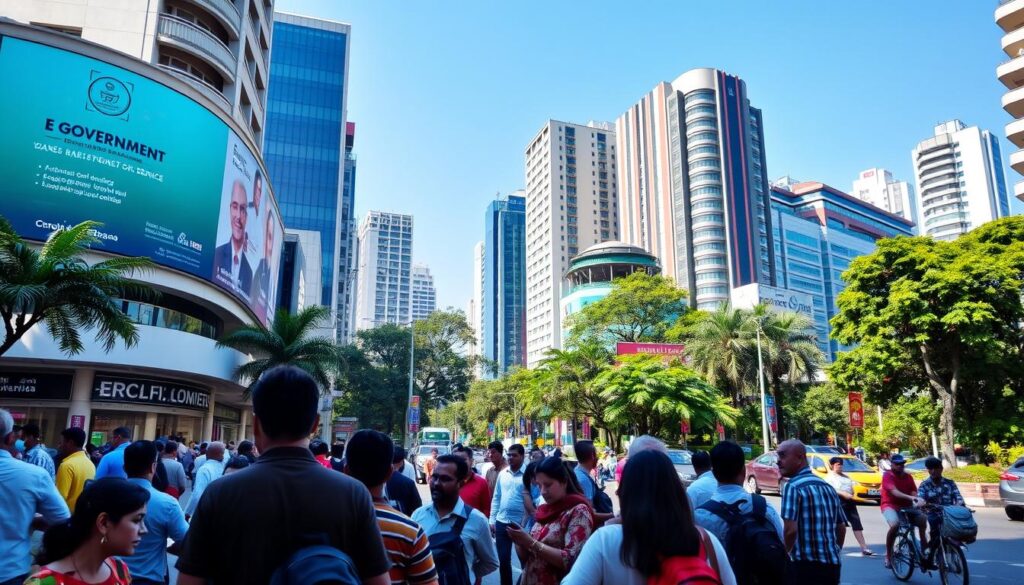Sri Lanka President Demands Fast Digital ID Rollout
President Anura Kumara Dissanayake of Sri Lanka wants a quick setup of the national digital identification system. He has given a tight 18-month deadline to complete this project. It is a key part of the digital governance strategy. This strategy aims to change how the nation delivers services and to strengthen the economy.
At the Sri Lanka Banks’ Association meeting, the President talked about the importance of digital projects by the government. These projects fight inefficiency and corruption. They also move the country towards a more clear and efficient economy. The effort to digitize shows President Dissanayake’s commitment, similar to Ranil Wickremesinghe‘s push for reform and innovation in state operations.
Industry experts underline the importance of digital identity in driving growth, cutting down fraud, and making things more efficient. This idea is supported by Dissanayake’s administration. Introducing the digital ID system is expected to push Sri Lanka towards better digital governance. It’s a change that will impact not just technology but also the country’s economic and social systems.

Sri Lanka’s Presidential Push for Swift Digital ID Adoption
Sri Lanka’s President is accelerating the digital ID program amidst a severe economic downturn. This 18-month project aims to improve online government services and boost financial access for all. It’s a key part of reviving Sri Lanka’s economy, with experts hopeful for significant impacts.
President Anura Kumara Dissanayake’s 18-Month Deadline
President Dissanayake has set a bold deadline to revamp digital governance. This effort seeks to upgrade Sri Lanka’s digital infrastructure. It’s seen as vital for enhancing e-government services and shaping government reform.
Streamlining Economic Recovery Through Digital Initiatives
To support these goals, a new biometric system will be put in place. It uses advanced tech for secure identity checks, from fingerprint to eye scans. This step is crucial for stronger and reliable digital governance.
Banking Sector’s Pivotal Role in Supporting Digital ID Rollout
The banking industry in Sri Lanka is set to be a key player. It will link biometric verification with everyday banking, ensuring safe and smooth electronic transactions. This move is expected to broaden financial access significantly.
| Initiative | Expected Impact | Timeline |
|---|---|---|
| Digital ID Rollout | Enhance security, Increase efficiency in public services | 18 months |
| Biometric Integration in Banking | Secure transactions, Greater financial inclusion | Ongoing, aligned with digital ID deployment |
| Technology Adoption in Identity Verification | Accurate and fast processing of data | Initial phase in first 6 months |
Sri Lanka is determined to lead in digital and biometric technology. This comprehensive digital push is aimed at overcoming economic hurdles and setting a regional benchmark.
Enhancing Digital Security and Public Awareness
In an era merging technology and governance, Sri Lanka is boosting its digital presence. It’s focusing on initiatives that increase economic growth and safeguard citizen privacy. For instance, the U.S. Embassy in Colombo and the local tech company WhimsicalWits have launched ‘Cyber Hero.’ This app aims to teach digital safety education and make users wise in their online lives.
Sri Lanka shines at 44th in the Global Services Location Index and is proactive in cybersecurity, ranking 83rd globally. With ‘Cyber Hero,’ part of the PORCH project, it addresses cyber risks and privacy issues. It aligns with the National Digital Policy, preparing for cybersecurity changes and guarding against cyber threats.
Digital literacy is crucial as Sri Lanka expands its digital ID project. U.S. Ambassador Julie Chung and Uthpala Pathirana of WhimsicalWits highlight the importance of global partnerships. They aim to raise Sri Lanka’s digital game. The National Digital Policy for 2020 – 2025 uses benchmarks like the Network Readiness Index to guide these efforts. Sri Lanka is ranked 81st out of 131 countries, pushing towards creating a digitally savvy citizenry.
Sri Lanka is integrating digital technology in public health and beyond, with over 85 major hospitals going digital. Projects like Cyber Hero showcase its dedication to progressing safely in the digital age. Its efforts to enhance healthcare through technology show a commitment to using tech for the public good. This ensures citizens are protected from digital risks.
